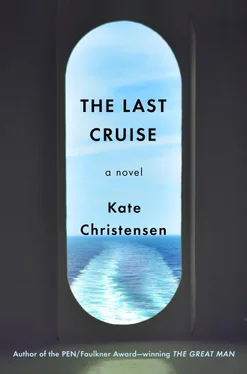“If you did, I didn’t hear it.”
“So maybe you’re going deaf.”
“Eccch,” said Miriam. She went into the tiny bathroom and turned on the shower.
*
In the buffet breakfast room, Christine collected a cup of black coffee and a bowl of yogurt with a scoop of fruit salad on top. Armed with her morning’s requirements, she headed up to yesterday’s nook and lounge chair, which she now thought of as her exclusive spot. Valerie was still asleep; Christine expected her to be out cold until early afternoon.
She arranged her breakfast on the table next to the chair and took from her bag the copy of Evelyn Waugh’s A Handful of Dust that she’d filched yesterday from the ship’s library, a windowless inner room on the sun deck with wingback armchairs and mahogany shelves and tasseled standing lamps. It was well stocked with books, including leather-bound editions of novels by Wodehouse and Cather and Wharton, much better than the schlocky charity-box crap she’d brought from the supermarket in Maine.
Instead of reading, she looked out at the view as she drank her coffee. The water swelled, rising and falling in heavy rhythm. The ocean looked like a miniature mountain range in constant liquid motion, dark fluid granite peaks veined with white, shifting, collapsing, forming new peaks. The dome of air from sea surface to sky-top was shot with bits of quick gold, charged with ions, dancing with refracted sunlight.
Nearby on the deck, there seemed to be a kerfuffle going on between a tall, indignant old man and a baffled crewmember, who looked hapless and very young.
“Oh, for God’s sake,” said someone behind her. “Good luck, Sasha.”
Christine turned and beheld an elderly woman a few lounge chairs over, staring down the deck in consternation. She was small and slender, and she looked simultaneously elegant and fierce in her gray long-sleeved T-shirt and peg-legged white trousers, her chestnut hair pinned up with a sparkling clip. Her small face was swathed in oversized sunglasses.
The woman noticed Christine and politely took off her sunglasses to look her directly in the eyes. “He’s up in arms because they’re making us share rooms. The ship isn’t even half full, but they won’t change it. I have to sleep with my ex-husband, can you imagine?”
The tall man walked off down the deck as the crewmember began straightening deck chairs, looking hangdog.
“Is that him?” Christine pointed to the tall old man’s very straight retreating back.
“No, that’s our first violinist. My ex-husband plays the viola. The cellist is around here somewhere. We’re a string quartet.”
“Oh,” Christine said, recognizing her. “I heard you playing during dinner last night. You were wonderful.”
“Thank you,” said the woman. “We’ve played together for a very long time. I’m Miriam, by the way.”
“Christine,” said Christine.
“Do you mind if I join you?”
“Not at all,” said Christine, hoping her face didn’t betray her hesitation. She had never been particularly fond of talking to strangers first thing in the morning.
Miriam brought her coffee over to the empty deck chair next to hers. “Are you from Los Angeles?”
“Oh no, not at all,” said Christine. “I’m from Maine. I’ve never been on a cruise before.”
“Lucky you. I’ve been on far too many. Well, it’s my job. And it pays well. We usually get our own rooms, though.”
“I’m sharing a room with my friend,” said Christine. “She invited me, so I can’t complain, but I didn’t realize how small they were going to be.”
“They’re usually bigger. But this is an old ship. And at least you don’t have to sleep with your ex-husband.”
Christine laughed. “I’m still on my first, and he’s at home.”
“Good for you. Kids?”
“No. Not yet. Do you have any?”
“I have two,” said Miriam. “A boy and a girl, the lights of my life. Rachel and Avner, their names are. I have grandchildren, too.”
Christine felt an unaccustomed urge to pry, or maybe it was just curiosity. She found herself liking this woman. “Did you always know you were going to be a mother? Or did you decide at some point?”
“It wasn’t a choice,” said Miriam. She seemed to welcome Christine’s interest. “It was an important thing for us all to have children. Our population was decimated, Israel needed people, to work and learn and carry on our traditions, we needed soldiers in the army, we needed the next generation of Jews.”
“That makes sense,” said Christine. “For me it’s completely different. I think all the time about overpopulation and extinction and climate change.”
Miriam put a hand on Christine’s arm. It felt surprisingly heavy and strong, like those little birds at the aquarium. “Two more won’t make a difference to the world. But they will make all the difference to you.”
“Maybe,” said Christine.
Miriam peered closely at her. “How old are you?”
“Thirty-six,” said Christine. “I know, I’m getting old.”
“Oh, you’re so young. Just don’t stay stuck. That’s the real mistake. Whatever you decide.” Miriam suddenly looked ancient and wise to Christine, all her elegance revealed to lie lightly on her, like a shimmer of fairy dust. But her eyes blazed as brightly as a girl’s. “Don’t be afraid of change.”
Christine felt a rush of relief, hearing this, although she wasn’t sure why. “Thank you,” she said. “That’s a good way to look at it.”
“I’ve never been afraid of change,” said Miriam. “That way, you don’t have to regret the things you didn’t do.”
“What’s it like, having your ex-husband in the quartet with you?”
Miriam laughed. “It’s a little like being married still, only without the headaches, because I don’t have to live with him. We live in the same building and we work together, but I have my own apartment, I can do as I please.”
Christine tried to imagine herself and Ed divorced, still working the farm together, but living apart, with their own individual lives outside of farmwork. She found the idea very attractive and didn’t quite know why.
“That sounds great,” she told Miriam.
“He still drives me crazy, so it’s half great,” said Miriam, waving a hand as if to send the other half of Isaac packing. “Neither of us remarried and we’re together all the time, so it’s like we never really split fully.”
“I work with my husband,” said Christine. “We’re together all the time, we work hard on our own land, and it’s a good life.” She hesitated. Sitting here in the hazy sea air, so far from land, gave her a feeling of safety, as if whatever she said would stay here in the ocean. “But sometimes I feel invisible,” she added slowly. “Like I’m disappearing.” She felt instantly sheepish for confessing something so fanciful.
But Miriam, to her credit, didn’t laugh. She didn’t say anything. She just went on watching Christine with her keen warm gaze.
*
Mick was supposed to meet Chef van Buyten at 1100 hours in the small office off the main galley. When he arrived at 1058, the two other executive sous-chefs were there already. They’d been introduced in the meeting the day before, but he’d forgotten their names. One of them was French, that much he remembered. The other was Asian, Japanese maybe. They were the same rank as Mick, but technically slightly above him in station, since they worked in the main galley, and Mick was running the buffet.
The Frenchman, small but wiry with muscle, sat backward in the chair by the inner wall, his shaved bullethead covered with a pugilistic stubble of black hair. He wore thick, black-rimmed glasses made even thicker and blacker by the echo of his thick, black eyebrows. He was also heavily tattooed, at least on his forearms and neck; the rest of him was hidden in his whites. Instinctively, Mick had no interest in provoking him. He knew the type. Quick-tempered for no good reason, prickly and unpleasant, and not as good as he thought he was, which Mick suspected was the real source of his bad temper.
Читать дальше












